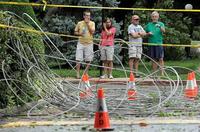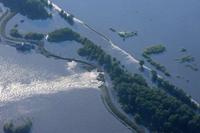-
Study finds majority of Americans unprepared for disasters
According to the latest survey by the Persuadable Research Corporation, half of the poll’s respondents believe they are unprepared for a disaster
-
-
Virginia receives $40 million in federal disaster aid following quake
Following the rare east coast earthquake last year, Virginia has received nearly $40 million in federal disaster aid
-
-
New York overhauls emergency response capabilities post-Irene

Last week New York Governor Andrew Cuomo proposed a series of major initiatives to bolster the state’s emergency response capabilities; the proposals specifically incorporate lessons learned from the state’s response to Hurricane Irene and Tropical Storm Lee
-
-
Fukushima accident caused only low levels of fallout in U.S.
Fallout from the 2011 Fukushima Dai-ichi nuclear power facility in Japan was measured in minimal amounts in precipitation in the United States in about 20 percent of 167 sites
-
-
2010 Russian heat wave caused by both manmade, natural causes
The heat wave that struck western Russia in summer 2010 killed 55,000 people and caused $15 billion in damage; a new study concludes that soaring temperatures were within the natural range for a Russian summer, but that due to human-induced climate change, the chance of such an extreme heat wave has tripled over the past several decades
-
-
Japan considers referendum to end nuclear power
Lawmakers in Osaka, Japan are currently mulling over whether to abandon nuclear power all together following the catastrophic nuclear accident at the Fukushima Daiichi atomic energy plant
-
-
Study finds disaster survivors more prone to fatal mistakes
A new study concludes that survivors of traumatic natural disasters may suffer from a decline in mental capabilities causing them to make grave errors in their daily lives
-
-
Union University bolsters emergency response with GPS 911 system
In an effort to bolster its emergency response capabilities Union University in Tennessee recently installed an enhanced 911 system
-
-
Caring for New York’s elderly in a disaster
Given the recent spate of natural disasters that struck the United States and New York City itself, community leaders there are concerned about disaster preparedness particularly for the city’s elderly and disabled populations
-
-
Invisibility cloak to protect buildings from earthquakes
Scientists show that by cloaking components of structures with pressurized rubber, powerful waves such as those produced by an earthquake would not “see” the building — they would simply pass around the structure and thus prevent serious damage or destruction
-
-
Preventing earthquake-induced soil liquefaction to protect buildings
When earthquakes occur, buildings can shift or fall; often, the failure is because of soil liquefaction, a phenomenon that occurs when loose, water-saturated soils lose strength in response to the sudden shaking from an earthquake, causing the soil to behave like a liquid; scientists have come up with a way to minimize liquefaction
-
-
Shape-memory alloys for earthquake-resistant structures

To improve the performance of structures during earthquakes, researchers have been investigating the use of “smart” materials, such as shape-memory alloys, which can bounce back after experiencing large loads
-
-
The causes of massive snow storms
Three storms spanning from December to February in the winter of 2009-10 had dumped a whopping 54.9 inches of snow on the Baltimore-Washington area; the snowfall broke a seasonal record first set in 1899; Snowmaggedon, as the winter was dubbed, entered the history books as the snowiest winter on record for the U.S. East Coast
-
-
Understanding how earthquakes work
Geologists have a new tool to study how earthquakes change the landscape down to a few inches, and it is giving them insight into how earthquake faults behave
-
-
Local officials oppose “unacceptable” levee ratings

In recent years as part of an effort to bolster the nation’s flood protection infrastructure, the Army Corps of Engineers has analyzed and declared more than 200 levee systems across the country as “unacceptable,” resulting in a firestorm of criticism from local officials
-
More headlines
The long view
Trump Aims to Shut Down State Climate Policies
President Donald Trump has launched an all-out legal attack on states’ authority to set climate change policy. Climate-focused state leaders say his administration has no legal basis to unravel their efforts.
